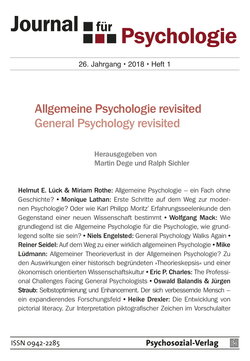Helmut E. Lück & Miriam Rothe
(PDF)
Sofortdownload
Dies ist ein E-Book. Unsere E-Books sind mit einem personalisierten Wasserzeichen versehen,
jedoch frei von weiteren technischen Schutzmaßnahmen (»DRM«).
Erfahren Sie hier mehr zu den Datei-Formaten.
Dieser Beitrag geht der Geschichte des Fachs Allgemeine Psychologie im deutschen Sprachbereich nach. Die Idee zur Etablierung eines solchen Wissenschaftsgebietes, das sich dem »normalen« Menschen widmet, kam bereits Ende des 18. Jahrhunderts auf. In der heutigen Allgemeinen Psychologie zeigt sich eine gewisse Geschichtsvergessenheit des Fachs, was unter anderem damit zusammenhängt, dass das Fach seine Entstehung erst der Diplomprüfungsordnung (DPO) von 1941 verdankt; andererseits haben Teilgebiete der Allgemeinen Psychologie, wie Wahrnehmung, Gedächtnis usw., eine lange und bedeutungsvolle Geschichte. Die fehlende Auseinandersetzung mit solchen früheren systematischen und theoretischen Ansätzen zur Allgemeinen Psychologie wird im Beitrag als Defizit benannt. Die bemerkenswerten inhaltlichen Wandlungen des Fachs Allgemeine Psychologie (das nach der Diplomprüfungsordnung von 1941 »Grundtatsachen des bewußten und unbewußten Seelenlebens in personund gemeinschaftspsychologischer Hinsicht« [II., §2, 2.a] behandeln sollte), die bis zu heutigen Themen der Kognitiven Psychologie bei unveränderter Fachbezeichnung reichen, haben zu einem erklärungsbedürftigen Zustand geführt: Allgemeine Psychologie ist inzwischen ein anderes Gebiet als zum Beispiel general psychology; außerdem sind die Themengebiete der Allgemeinen Psychologie – auch durch Studienreformen – weniger verbunden, als dies wünschenswert wäre. Die vergleichsweise geringe Bedeutung von Theoretischer Psychologie sowie der Geschichte von Fach und Inhalten der Allgemeinen Psychologie werden als Defizite herausgestellt.
Abstract:
This article deals with the history of the German subject »Allgemeine Psychologie« (general psychology) in academic education. Already at the end of the eighteenth century the idea of such an area of research dealing with the »normal« person was suggested. In present-day general psychology in Germany a certain degree of abstinence toward the history of the subject can be seen. This abstinence is related to the late institutionalization of the German academic diploma in psychology in 1941. However, research areas of general psychology like perception, memory, learning etc. have a long, meaningful and rewarding history. The missing discussion about earlier systematic and theoretical approaches within Allgemeine Psychology is seen as a deficit here as well. According to the examination regulation dated 1941 Allgemeine Psychologie originally was intended to deal with »basic facts of conscious and unconscious inner life in regard to personand collective-psychological aspects« [II., § 2, 2.a]. From then up to the contemporary areas of cognitive psychology changes have taken place which are necessary to be explained here: German Allgemeine Psychologie meanwhile has become a field different from general psychology taught in other countries. Furthermore the subdisciplines of Allgemeine Psychology taught at universities are less integrated than desirable. This is partially due to past reforms in academic education. Also, the rather marginal significance of Theoretical Psychology within the topic of Allgemeine Psychologie, and the rare discussion of the history of Allgemeine Psychologie are seen as deficiencies of the domain.
Abstract:
This article deals with the history of the German subject »Allgemeine Psychologie« (general psychology) in academic education. Already at the end of the eighteenth century the idea of such an area of research dealing with the »normal« person was suggested. In present-day general psychology in Germany a certain degree of abstinence toward the history of the subject can be seen. This abstinence is related to the late institutionalization of the German academic diploma in psychology in 1941. However, research areas of general psychology like perception, memory, learning etc. have a long, meaningful and rewarding history. The missing discussion about earlier systematic and theoretical approaches within Allgemeine Psychology is seen as a deficit here as well. According to the examination regulation dated 1941 Allgemeine Psychologie originally was intended to deal with »basic facts of conscious and unconscious inner life in regard to personand collective-psychological aspects« [II., § 2, 2.a]. From then up to the contemporary areas of cognitive psychology changes have taken place which are necessary to be explained here: German Allgemeine Psychologie meanwhile has become a field different from general psychology taught in other countries. Furthermore the subdisciplines of Allgemeine Psychology taught at universities are less integrated than desirable. This is partially due to past reforms in academic education. Also, the rather marginal significance of Theoretical Psychology within the topic of Allgemeine Psychologie, and the rare discussion of the history of Allgemeine Psychologie are seen as deficiencies of the domain.
Martin Dege & Ralph Sichler S. 3–8Editorial (PDF)
Helmut E. Lück & Miriam Rothe S. 9–29 (PDF)
Monique LathanS. 30–48 (PDF)
Wolfgang MackS. 49–73 (PDF)
Niels EngelstedS. 74–96General Psychology Walks Again (PDF)
Reiner SeidelS. 97–122 (PDF)
Mike LüdmannS. 112–122 (PDF)
Eric P. CharlesS. 123–130The Professional Challenges Facing General Psychologists (PDF)
Oswald Balandis & Jürgen Straub S. 131–155Selbstoptimierung und Enhancement (PDF)
Der sich verbesserndeMensch - ein expandierendes ForschungsfeldHeike DrexlerS. 156–177 (PDF)
Helmut E. Lück & Miriam Rothe S. 9–29 (PDF)
Monique LathanS. 30–48 (PDF)
Wolfgang MackS. 49–73 (PDF)
Niels EngelstedS. 74–96General Psychology Walks Again (PDF)
Reiner SeidelS. 97–122 (PDF)
Mike LüdmannS. 112–122 (PDF)
Eric P. CharlesS. 123–130The Professional Challenges Facing General Psychologists (PDF)
Oswald Balandis & Jürgen Straub S. 131–155Selbstoptimierung und Enhancement (PDF)
Der sich verbesserndeMensch - ein expandierendes ForschungsfeldHeike DrexlerS. 156–177 (PDF)

